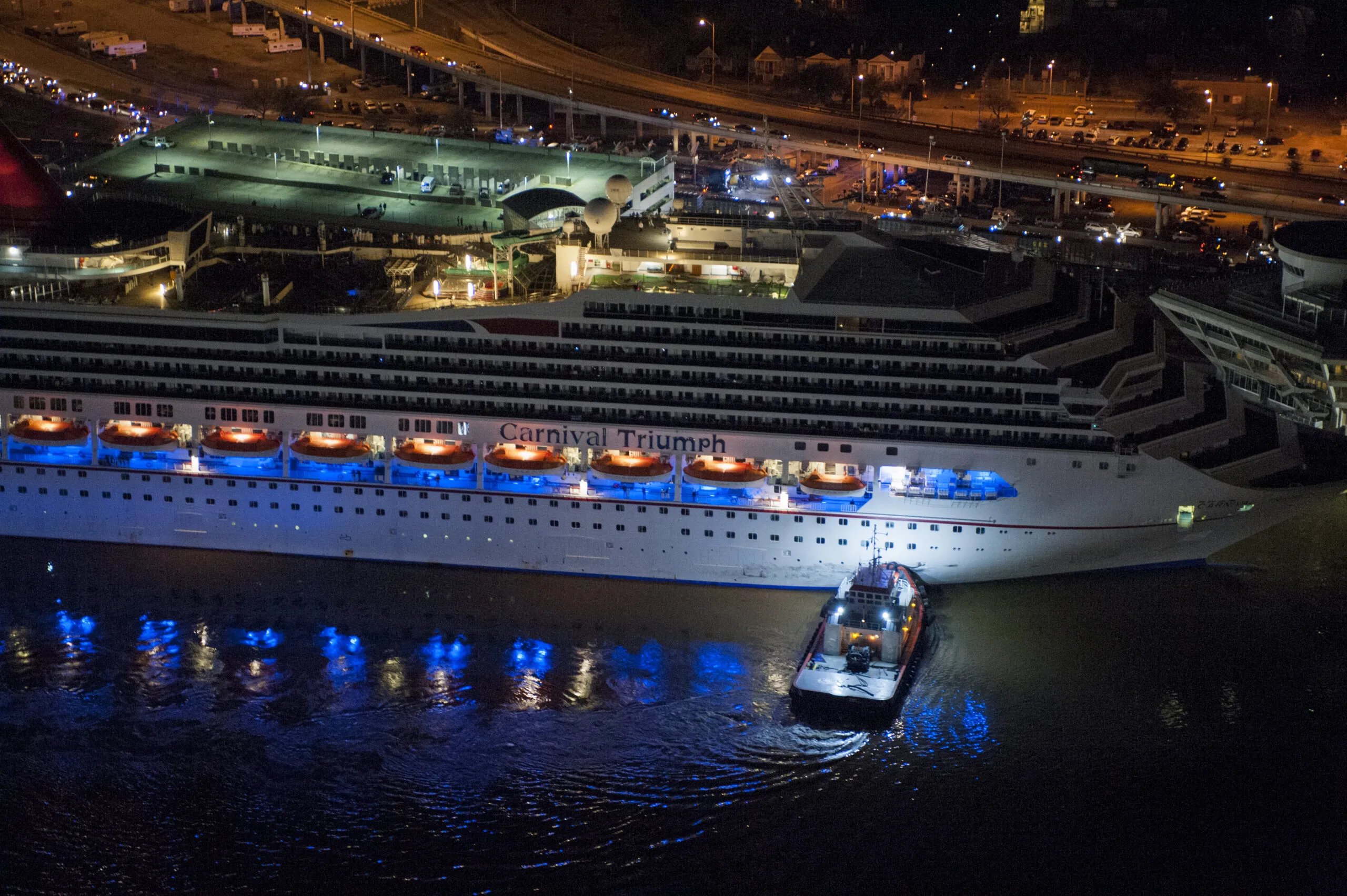From Astroworld’s tragic chaos to the political scandal of Rob Ford and this month’s high-flying drug drama Cocaine Air, Netflix is carving out a space for messy, headline-grabbing history. And with cruise ships back in the public eye (for both their environmental impact and viral horror stories), Trainwreck feels less like nostalgia and more like a warning label. The latest installment of the Netflix original dives into the 2013 Carnival Cruise disaster, and it might leave you wondering if vacationing at sea is all its cracked up to be.
Better known as the “Poop Cruise,” this unforgettable moment in time left thousands of passengers stranded at sea without power, plumbing or air conditioning. It’s a nightmarish ordeal that dominated headlines and left a lasting stain on how many people view cruising.
Does Carnival Cruise Line have a bad reputation?
Carnival Cruise Line is known for its budget-friendly fares, lively party atmosphere, and family-oriented entertainment – but it also carries a complicated reputation. While millions sail with Carnival every year without issue, the brand has become synonymous with mishaps, thanks to a string of high-profile incidents that have played out in the media.
From engine fires and mechanical breakdowns to overflowing toilets and public health concerns, Carnival has weathered its fair share of PR disasters, most notably the 2013 “Poop Cruise.” Beyond the headlines, the company has also faced scrutiny for environmental violations, including illegal waste dumping.
While Carnival remains one of the most popular cruise lines in the world, for many travelers, its name still evokes images of chaos, questionable cleanliness and corporate corner-cutting. So yes, Carnival’s reputation has taken a hit, and despite efforts to rebrand and revamp, the internet never forgets.
Do cruises dump waste?
Cruise ships generate tons of waste, and while much of it is treated or managed according to international laws, some of it does end up in the ocean. Under international regulations like MARPOL and U.S. environmental laws, ships must treat waste before discharging it at sea, but enforcement is spotty, and violations are common.
In fact, Carnival Corporation (the parent company of Carnival Cruise Line) was fined $40 million in 2016 for illegally dumping oily waste and covering it up. That wasn’t the end; they’ve faced additional fines and probation violations since then. While many cruise lines now promote greener practices and invest in onboard treatment systems, the industry’s track record isn’t exactly spotless. So while not all cruise waste is dumped illegally, the ocean has definitely taken the brunt of some shady practices.
How long was the ‘Poop Cruise’ stranded?

The infamous “Poop Cruise” (officially known as the Carnival Triumph incident), left passengers stranded for five days in miserable conditions. On Feb. 10, 2013, an engine-room fire knocked out power and plumbing while the ship was sailing in the Gulf of Mexico.
The Guardian reported that with no working toilets, no air conditioning, and limited food, over 4,000 passengers and crew were left to endure overflowing sewage, makeshift tent cities on deck and the smell of raw waste spreading throughout the ship. The vessel was eventually towed to Mobile, Alabama, arriving on Feb. 14. By then, it had already become a viral nightmare, forever earning its nickname and a place in cruise ship infamy.
What we know about the 2013 lawsuit
After the Carnival Triumph disaster, dozens of passengers filed lawsuits against Carnival Cruise Line, claiming negligence, emotional distress and unsafe conditions during the five-day ordeal. However, despite the horror stories and media frenzy, the legal results were underwhelming.
Carnival argued that it wasn’t liable for the fire because it was a “marine casualty” and pointed to the fine print on every cruise ticket, which waives certain passenger rights and limits liability. Maritime law is notoriously protective of cruise companies, and courts often side with them unless there’s clear, gross negligence.
Most of the lawsuits were either dismissed or quietly settled. In one high-profile case, a federal judge ruled that although conditions were “awful,” they didn’t amount to a legally actionable injury under maritime standards. In the end, Time Magazine reported that Carnival offered passengers full refunds, $500 per person, credit toward a future cruise and reimbursement for travel expenses. The lawsuits may not have sunk the company, but they did force Carnival to invest hundreds of millions into ship upgrades, safety protocols and damage control (both literal and reputational).
What is the Carnival Triumph called now?
The Carnival Triumph was officially renamed Carnival Sunrise following a significant $200 million refurbishment in 2019 per Travel Weekly. This extensive two-month overhaul at the Navantia shipyard in Cádiz, Spain was part of Carnival Cruise Line’s broader fleet enhancement program, which aimed to revitalize older ships with modern amenities and updated designs.
The renovation introduced a plethora of new features and upgrades. Dining options expanded to include venues like Guy’s Pig & Anchor Bar-B-Que Smokehouse, Cucina del Capitano, Bonsai Sushi Express and the upscale Fahrenheit 555 Steakhouse. Entertainment enhancements featured the WaterWorks aqua park with towering slides, the Serenity adults-only retreat and the SportSquare complex offering activities such as a ropes course and mini-golf.
All staterooms received a redesign with island-inspired decor, and over 50 new cabins were added to maximize space utilization. The ship’s technical systems were also upgraded to improve performance and efficiency. Following its debut as the Carnival Sunrise on Apr. 29, 2019, the ship embarked on a series of voyages from Norfolk, Virginia, before repositioning to New York City for summer cruises and later to Fort Lauderdale for winter itineraries. This rebranding marked a new chapter for the Carnival Triumph, distancing it from its past and offering guests a revitalized cruising experience.
Are cruises losing popularity?
According to the Cruise Lines International Association (CLIA), the global cruise industry welcomed 34.6 million passengers in 2024, a 9.3% increase over 2023. This growth trajectory is expected to continue, with projections of 37.7 million passengers in 2025 and 41.9 million by 2028.
Notably, 31% of cruisers over the past two years were first-time passengers, indicating a strong influx of new travelers into the market. The industry’s appeal is broadening, particularly among younger demographics. JPMorgan reports that Millennials and Gen X travelers are increasingly choosing cruises, with 73% of them considering a cruise vacation.
Frequently Asked Questions
Do cruise lines actually make money?
Yes, and a lot of it. Despite pandemic setbacks, the cruise industry has rebounded in a big way. Major lines like Carnival, Royal Caribbean and Norwegian generate billions annually through ticket sales, onboard purchases (like drinks, excursions and casino games), and even partnerships with private islands.
Is there a jail on Carnival Cruises?
Most large cruise ships, including Carnival’s, have a small detention room called a brig. It’s not exactly Orange Is the New Black, but it’s where security can hold passengers who get violent, break laws or create serious disruptions. Once the ship docks, authorities at the next port usually take over.
